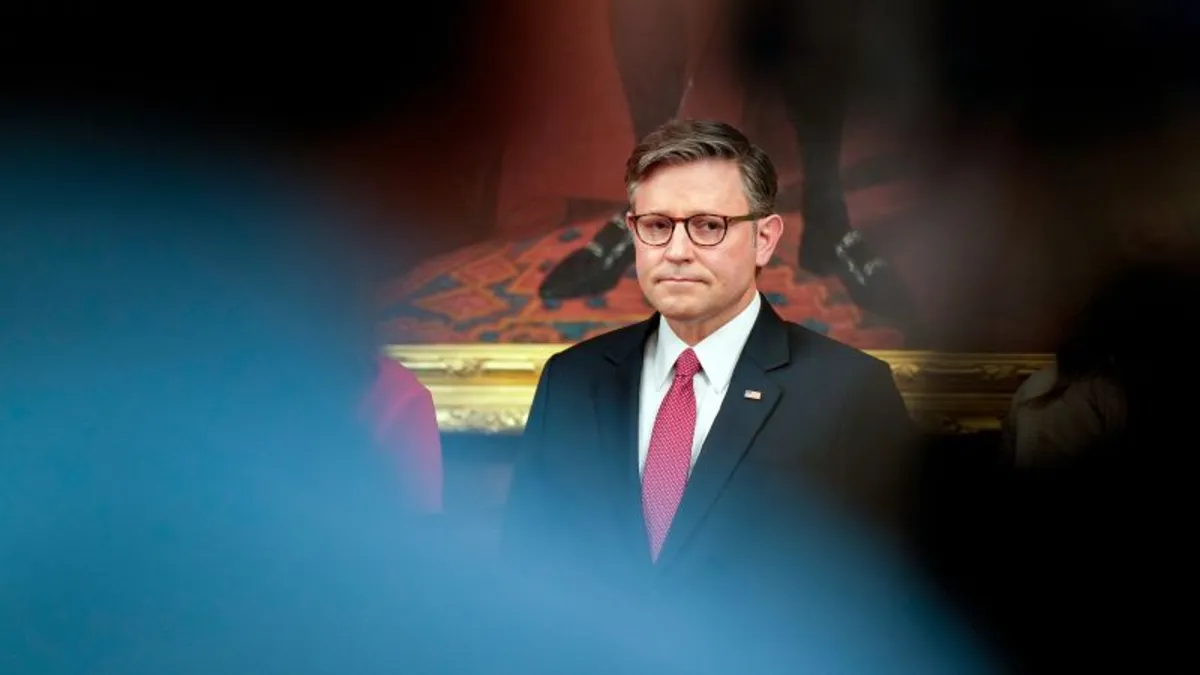
On Monday, Speaker Mike Johnson announced that he does not intend to allow any votes on measures related to the Jeffrey Epstein case during the House's final week in Washington before a lengthy recess. This decision comes despite mounting pressure from some GOP members who are eager for the House to take a stand on this controversial issue. The Epstein case continues to resonate deeply with the MAGA base, as many of President Donald Trump’s staunch supporters push for transparency regarding the allegations surrounding Epstein.
Certain members of the Republican Party have been advocating for a vote to demonstrate their commitment to transparency in the Epstein saga. This issue remains significant to Trump’s supporters, even as the former president has attributed the ongoing scrutiny to Democratic efforts to tarnish his reputation. A vote requiring the Trump administration to release documents related to Epstein would represent a significant move against the president by his own party's base. However, efforts to bring such measures to the floor have not gained traction among party leaders on Capitol Hill.
Speaking to CNN, Johnson stated that the full House would not vote on a pending measure from his party members—a non-binding resolution requesting the release of additional Epstein files—before the upcoming August recess. “My belief is we need the administration to have the space to do what it is doing,” he explained, emphasizing that further congressional action would be considered only if deemed necessary. Johnson reiterated his alignment with President Trump, asserting, “There is no daylight between the House Republicans and the president on maximum transparency.”
Despite Johnson's firm stance, a bipartisan coalition of House members, led by Kentucky Rep. Thomas Massie, is working to bypass Johnson's leadership and force a vote on a different bill that demands the release of Epstein files. For this measure to proceed, Massie needs a majority of House members to back a discharge petition. If successful, this would compel the full House to consider the bill no sooner than after Labor Day.
As it stands, ten House Republicans have endorsed Massie's initiative, which could trigger a full vote in the GOP-controlled House if all Democrats also support it. However, immediate public release of new documents is unlikely. The discharge petition process requires seven legislative days before lawmakers can collect the necessary signatures, and only after obtaining support from 218 members can the measure be brought to the floor for a vote.
The measure proposed by Massie and California Democratic Rep. Ro Khanna goes beyond simply releasing grand jury materials; it mandates the Trump administration to disclose all unclassified records, documents, communications, and investigative materials related to Epstein within a 30-day timeframe. It also requires the White House to publish a list of all government officials and politically exposed persons mentioned in the released materials, a demand that has resonated with Trump's base.
While many Democrats have historically criticized the proliferation of conspiracy theories surrounding Epstein, there has been a recent shift toward advocating for greater transparency. House Democratic Leader Hakeem Jeffries pointed out that the continued invocation of names like President Joe Biden and former President Barack Obama is indicative of Trump’s fears and the need for transparency regarding the Epstein case. With unanimous Democratic support, only a handful of additional Republican votes would be required to meet the necessary threshold for the measure.
Among the Republicans supporting the push for transparency are Reps. Marjorie Taylor Greene, Tim Burchett, Eric Burlison, and others. They are echoing the sentiment that the public deserves to know more about Epstein, a notorious convicted pedophile. Greene noted that a significant volume of constituent calls to her office has centered around the Epstein issue, reflecting a strong public desire for information.
Looking ahead, Massie expressed optimism that momentum for transparency would continue to build. He remarked to CNN, “I think when we return in September, we’ll get phase two of the Epstein files.” However, as with many legislative efforts, there is a possibility that this initiative may lead to extensive discussions without substantial action.
In the preceding week, Republicans faced challenges in advancing a $9 billion spending cut package while deliberating the Epstein case. Ultimately, they settled for a non-binding resolution focused on file release, leaving Johnson's commitment to transparency in question. The ongoing discourse surrounding Epstein is likely to generate continued tension, particularly given Trump’s acknowledgment of the complexities involved in this issue. He remarked on his Truth Social platform about the challenges of appeasing those demanding more information.
In response to Trump's frustrations with the ongoing demands for information, various Republican leaders, including Rep. Don Bacon, have voiced their support for greater transparency regarding Epstein. Bacon stated, “I think sunlight is a good medicine,” advocating for the release of more information to dispel conspiracy theories surrounding the case. He emphasized the importance of factual clarity and suggested that Congress has the oversight authority to pursue this matter further.
The Justice Department has stated there is no existing Epstein “client list,” and the complexities surrounding the case continue to unfold. As discussions progress, it remains to be seen how the calls for transparency will influence the legislative agenda when Congress reconvenes in September.
This article has been updated to include additional details and insights from various lawmakers. Contributions to this report were made by CNN’s Morgan Rimmer, Nicky Robertson, Arlette Saenz, and Jenna Monnin.